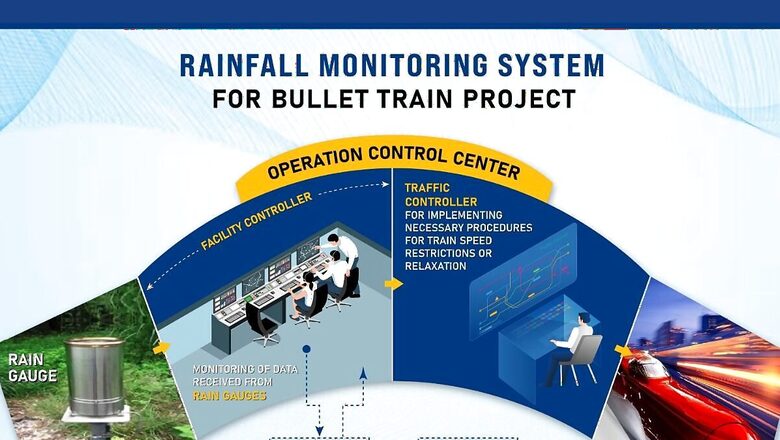
views
India’s first bullet train, officially called Mumbai-Ahmedabad High-Speed Rail Corridor (MAHSR), will have Automated Rainfall Monitoring System to enhance safety and make informed decisions regarding train operations, particularly in areas susceptible to heavy rain and its effects on earth structures and natural slopes.
In a statement, National High Speed Rail Corporation Limited (NHSRCL), the body undertaking the construction, announced on Friday that the system will provide real-time data on rainfall using rain gauges, equipped with an advanced instrumentation system.
“To ensure the safe operations of Bullet Train services, an automated Rainfall Monitoring System has been adopted… Each gauge contains a tripping cell that generates signal pulses in response to the collected rain volume. These pulses are transmitted via a signal communication line to the Facility Controller System at the Operation Control Centre (OCC), where they are meticulously displayed and monitored,” the statement added.
The system will provide two critical measurement values – hourly rainfall (the amount of rainfall recorded in the last hour) and 24-hour rainfall (the cumulative rainfall over the past 24 hours). These measurements, they added, are crucial for making informed decisions regarding train operations, particularly in areas susceptible to heavy rainfall and its effects on earth structures and natural slopes.
“Specific regulations will be enforced based on the rainfall data and threshold values, type of earth structure and natural slopes for each section duly validated by patrolling teams activated through Maintenance Centres,” it added.
Six instrumented rain gauge stations are proposed to be installed along the Mumbai-Ahmedabad Bullet Train corridor, in Thane and Palghar districts, specifically near vulnerable earth structures, mountain tunnel entrance/exit and tunnel portals etc.
Areas with significant cuttings and potential landslide risks will also be closely monitored. Rain gauge influence radius is nearly 10 km.
The bullet train project is an important one with the total cost estimated at about Rs 1 lakh crore in 2015, that will go further up by the time the project is completed. About 81 per cent of the cost is being funded by the Government of Japan and remaining is being provided through the Equity by the shareholders — Government of India (Ministry of Railways) (50%), Government of Gujarat (25%) and Government of Maharashtra (25%).
The project started in September 2017 and was expected to be completed by December 2023. However, it is delayed. Now, it is being expected that one of the stretches can be started around 2026.




















Comments
0 comment